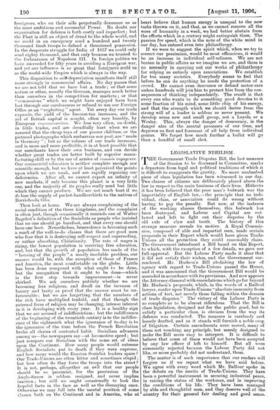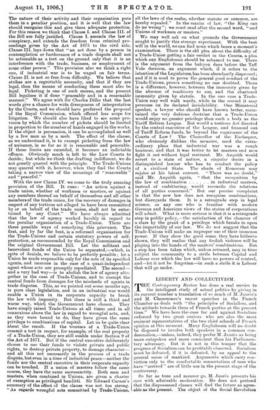LEGISLATIVE NIHILISM. T HE Government Trade Disputes Bill, the last measure
of the Session to be discussed in Committee, marks a departure from legal and political traditions of which it is difficult to exaggerate the gravity. No more unabashed piece of class legislation has been witnessed in our day. Two classes of citizens are deliberately placed above the law in respect to the main business of their lives. Hitherto it has been believed that the poor man's bulwark was the impartiality of English law,—the principle that no indi- vidual, class, or association could do wrong without having to pay the penalty. But now, at the instance of the working classes themselves, this bulwark has been destroyed, and Labour and Capital are out- lawed and left to fight out their disputes by the old rule of claw and tooth. The history of this strange measure reveals its motive. A Royal Commis- sion, composed of able and impartial men, made certain proposals in their Report which would have given Trade- Unions all the protection they could reasonably The Government introduced a Bill based on this Report, to which, with the exception of a few details, we gave our full approval. But the Labour Party made it clear that it did not satisfy their wishes, and the Government sur- rendered. Mr. Hudson's Bill abolishing the law of agency with regard to Trade-Unions passed the House, and it was announced that the Government Bill would be amended in accordance with its provisions. And now appears the Attorney-General with emendations which go far beyond Mr. Hudson's proposals, which, in the words of a Radical lawyer, confer upon Trade-Unions "absolute immunity from actions of tort, not merely those falling within the domain of trade disputes." The victory of the Labour Party is so complete as to be almost ridiculous. That the Bill is class legislation, designed not for the public good, but to satisfy a particular class, is obvious from the way its defence was conducted. The measure is carelessly and loosely drafted, and as it stands will furnish a noble crop of litigation. Certain amendments were moved, many of them not touching any principle, but merely designed to make the Bill more easy to interpret. It is difficult to believe that some of these would not have been accepted by any law officer if left to himself. But all were summarily rejected because the Labour Party did not like, or more probably did not understand, them.
The matter is of such importance that our readers will forgive us if we repeat what we have said before. We agree with every word which Mr. Balfour spoke in the debate on the merits of Trade-Unions. They have been a powerful instrument in securing industrial peace, in raising the status of the workman, and in improving the conditions of his life. • They have been managed by able and thoughtful men, and they deserve well of the country for their general fair dealing and good sense. The nature of their activity and their organisation puts them in a peculiar position, and it is well that the law should recognise this and give them adequate protection. For this reason we think that Clause I. and Clause III, of the Bill are fully justified. Clause I. amends the law of conspiracy, and extends the freedom from criminal pro- ceedings given by the Act of 1875 to the civil side. Clause III. lays down that "an act done by a person in contemplation or furtherance of a trade dispute shall not be actionable as a tort on the ground only that it is an interference with the trade, business, or employment of some other person." This provision also we think a right one, if industrial war is to be waged on fair terms. Clause II. is not so free from difficulty. We believe that strikes are a regrettable necessity, and that if they are legal, then the means of conducting them must also be legal. Picketing is one of such means, and the present Bill legalises it if done "peaceably and in a reasonable manner." We agree with Sir Charles Dilke that the last words give a chance for wide divergences of interpretation by the Courts, and we should have preferred the proposal of the Royal Commission, which offered less scope for litigation. We should also have liked to see some pro- vision by which the number of pickets should be limited in proportion to the number of hands engaged in the works. If the object is persuasion, it can be accomplished as well by a few men as by a mob. The effect of the clause, as we understand it, is to exempt picketing from the law of nuisance, in so far as it is reasonable and peaceable. If these limits are exceeded, it becomes an indictable offence. Obviously much is left to the Law Courts to decide; but while we think the drafting indifferent, we do not greatly quarrel with the principle. The Trade-Unions may quarrel with it, however, when they find the Courts taking a narrow view of the meanings of " reasonable " and "peaceful."
With the new Clause IV. we come to the truly amazing provision of the Bill. It runs : "An action against a trade union, whether of workmen or masters, or against any members thereof on behalf of themselves and all other members of the trade union, for the recovery of damages in respect of any tortious act alleged to have been committed by or on behalf of the trade union, shall not be enter- tained by any Court." We have always admitted that the law of agency worked harshly in regard to the peculiar organisation of a Trade-Union. There are three possible ways of remedying this grievance. The first, and by far the best, is a reformed organisation for the Trade-Unions and certain statutory powers of self- protection, as recommended by the Royal Commission and the original Government Bill. Let the militant and benevolent funds of the Union be separated,—which, in spite of denials, we believe to be perfectly possible ; let a Union be made responsible only for the acts of its specified agents, and immune in the case of a quasi-independent agent whose acts are promptly repudiated. The second— and a very bad way—is to abolish the law of agency alto- gether in the case of Trade-Unions, and to exempt the central funds from damages for the misdeeds of agents in trade disputes. This, as we pointed out some months ago, is pure class legislation, and in an industrial war would enable a Union in its corporate capacity to break the law with impunity. But there is still a third and worse way, which the Government have chosen. They have simply raised Trade-Unions at all times and in all connexions above the law in regard to wrongful acts, and, as they were bound to do, they have given the same privilege to combinations of capital. Let us be quite clear about the result. If the trustees of a Trade-Union commit a tort in respect, for example, of the real property of a Trade-Union, they are still suable under Section 9 of the Act of 1871. But if the central executive deliberately choose to use their funds to violate private and public rights, to destroy private property, to damage character— and all this not necessarily in the process of a trade dispute, but even in a time of industrial peace—neither the funds nor the central executive in their corporate capacity can be touched. If a union of masters follow the same course, they have the same sacrosanctity. Both men and masters, when combined in Unions, are given a charter of exemption as privileged banditti. Sir Edward Carson's summary of the effect of the clause was not too strong. "As regards wrongful acts committed by Trade-Unions, all the laws of the realm, whether statute or common, are hereby repealed." In the maxim of law, "the King can do no wrong "; we must read after the second word, "and Unions of workmen or masters."
We may well ask on what grounds the Government sought to justify this strange experiment. With the best will in the world, we can find none which bears a moment's examination. There is the old plea about the difficulty of a Trade-Union getting a fair verdict in the Courts, a plea which any Englishman should be ashamed to use. There is the argument from the halcyon days before the Taff Vale decision, an argument which, if it refers to the intention of the Legislature, has been abundantly disproved ; and if it is used to prove the general good conduct of the Trade-Unions, proves something no one doubted. There is a difference, however, between the immunity given by the absence of machinery to sue, and the chartered immunity given by statute. In the one case a Trade- -Union may well walk warily, while in the second it may presume on its declared inviolability. One Ministerial speaker, a lawyer who should have known better, main- tained the very dubious doctrine that a Trade-Union would enjoy no greater privilege than such a body as the Tariff Reform League. But would a tortious Act directed by the central executive of the League, and financed out of Tariff Reform funds, be beyond the cognisance of the Courts of Law ? The Chancellor of the Exchequer, who obviously dislikes the measure, used the extra- ordinary pleas that industrial war was a rough business, and that it was better to let masters and men fight it out without legal restraint. Mr. Asquith would revert to a state of nature, a singular desire in a distinguished lawyer who has to conduct the policy of a civilised State. The shade of Rousseau may rejoice at his latest convert. "There was no doubt," said Mr. Asquith again, "that the recognition by the law of combination in industrial matters, instead of embittering, would reconcile the relations of all parties concerned." But our precise complaint is that the new law does not recognise combinations, but disregards them. It is a retrograde step in legal science, as any one who is familiar with modern German and American views of the status of corporations will admit. What is more serious is that it is a, retrograde step in public policy,—the satisfaction of the clamour of a class by the grant of a privilege which breaks in upon the impartiality of our law. We do not suggest that the Trade-Unions will make an improper use of their immense power. If they show the good sense they have hitherto shown, they will realise that any foolish violence will be playing into the hands of the masters' combinations. But a step has been taken which, unless retraced, may in time subject the community to a strife between Capital and Labour over which the law will have no powers of control, and—let it not be forgotten—in such a strife it is Labour that will go under.



































 Previous page
Previous page